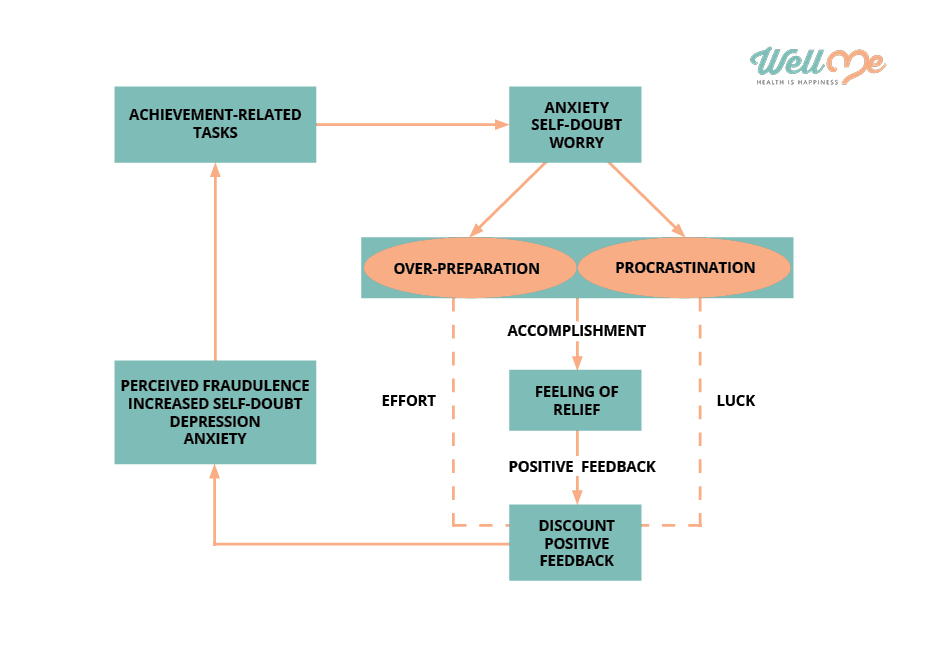Fraud. Undeserving. Fake. Impostor. These words are what appear on repeat in the heads of nearly 70 percent of people for some period of their life. Do these words ring true for you as well? If so, you might be a part of the group that suffers from impostor syndrome (also spelled imposter syndrome). This is a phenomenon that causes you to feel like your success or abilities are not a result of your own hard work. Instead, you think they are due to external factors. Therefore, you might feel undeserving or inadequate. While the basis of this syndrome focuses on the concept of fakeness, its effects on people are very real.
If you suffer from impostor syndrome you might also feel depressed or anxious. This could be centered around your work life, but could also refer to other areas of your life too. Feelings like this, if not addressed, can seriously damage your self-image and quality of life. You don’t want to go through life feeling inadequate and unable to enjoy what you DO, in fact, deserve. But the first step in overcoming anything, is realizing and admitting you have a problem. In this case, the underlying problem is usually self-esteem.[1]
Imposter syndrome can look and feel different for different people, so it’s good to read on with an open mind. We’ll share some examples of this condition and some ways you can self-assess yourself to see if you apply. Most importantly, we’ll go over ways to cope with your feelings and overcome them so you can live your life with confidence.
What is Imposter Syndrome?

So, what is imposter syndrome? This psychological state was first coined as “imposter phenomenon” by two female psychologists in a 1978 journal.[2] They originally wrote that this affects successful women, but have since been disproved. This resonates with both men and women of various socioeconomic groups. However, it tends to affect members of minorities more than others.
This is attributed to the fact that this syndrome is related to feelings of displacement. In alignment with that, minorities may include women in STEM (science, technology, engineering and math) fields, foreign students or masters/PhD students, or racial minorities in leadership roles.[3]
Impostor syndrome may arise for a number of reasons, some of which can be traced back to your family dynamics. If you had parents that demanded too much of you, you may continue to discount your achievements later in life.[4] Or your personality may be a factor in your suffering instead. Neuroticism specifically is strongly correlated with impostor syndrome. This is because it contributes to the need to overwork and have no errors.[5]
Definition

Impostor syndrome is a psychological disorder defined by Webster’s Dictionary as a “false and sometimes crippling belief that one’s successes are the product of luck or fraud rather than skill”.[6] It’s not a mental illness, and can be temporary. It’s important to note that this only applies if you are not a real impostor (can you say oxymoron?). So, if you’re a con-woman printing fake bills to run a pyramid scheme company, this doesn’t apply to you!
Alternatively, if you feel like your life is undeserved compared to those less fortunate, or your work promotions were only won due to a lack of competition, you may be dealing with this syndrome.
The Impostor Syndrome Cycle

The diagram above by Dr. Pauline Clance illustrates the cycle of impostor syndrome. The cycle always starts with receiving an achievement-related task. This can be a task from work or school (e.g. a report or assignment). Once the individual receives the task, feelings of anxiety, self-doubt, and worry immediately follow.
The individual then responds by either over-preparing or procrastinating. Regardless of which response is chosen, he/she will eventually accomplish the task. This is followed by a sense of relief. If positive feedback is given, the individual will disregard it anyway.
If the individual responded with over-preparation, he/she will view the accomplishment of the task as sheer effort and hard work. On the other hand, if the individual responded with procrastination, he/she will view the accomplishment as a matter of luck. They will not attribute the outcome to true personal ability.
This leads to perceived feelings of fraudulence. With each cycle, feelings of self-doubt, depression, anxiety, and fraudulence will intensify.
Tip: The Imposter Cycle can be broken! When feelings of self-doubt, or anxiety come up, don’t over-prepare or procrastinate. Write a plan down for accomplishing it slowly. Be fair to yourself and realistic in your expectations.
Examples of Impostor Syndrome
There are five main profiles of impostor syndrome, according to Dr. Valerie Young, recognized impostor syndrome expert.[7] All the symptoms contribute to the internal feeling of intellectual phoniness.[8] If you don’t completely fit into one of these boxes, you could still have this syndrome, just in a less extreme form. Try to see which impostor syndrome example you best fit into. This way, it’s easier to target your destructive thinking and recognize how to make a change.
1. The Perfectionist

Has anyone ever called you tedious, or told you that your work looks overdone? Perfectionism is a widely used term that is actually a real disorder. If you’re a perfectionist, you might have an obsession with producing only excellent work. This comes as a result of your demanding standards for yourself, that are not necessarily healthy.[9]
When perfectionists don’t meet their own standards, they self-criticize fiercely. When they do, they reassess what their goals were and may feel defeated they didn’t set the bar higher. At times, perfectionists even refrain from attempting to achieve success out of the fear of failure. People who are anorexic or bulimic fall into the category of perfectionists as well, because of the unrealistic body standards idealized.[10]
2. The Superwoman

If you feel like you have to work all the time and juggle multiple roles to prove your place, you might be a fit for this category.[11] Being Superwoman isn’t easy, and usually comes at a cost to your mental or physical health. This type of imposter syndrome victim can be like a workaholic. Meaning, they always stay late at work and feel like they have to prove themselves.
All of this, despite their already extensive education or certification for their role. If you identify with this, you may also think poorly of down-time, and feel the need to be productive at all waking hours of the day. This stems from the love of external affirmations, meaning you like being acknowledged for your work by others as a way to prove your qualifications to yourself.
3. The Natural Genius

Even with very few recorded geniuses in the world, you might feel as though your work or learning should correlate with the time you spend on it.[12]
So, if it takes you a long time to do something, you might feel bad about it regardless of the quality.[13] This type of suffering is heavily rooted in comparison to others. Comparing yourself to others is not usually beneficial anyway, but at extreme levels it can give you a disillusioned image of what others are capable of compared to yourself.
4. The Soloist

Soloists would usually rather do something themselves rather than ask for help or support.[14] This is because they feel like asking for help proves they are incapable or unworthy of the task.
On the surface this seems like an obvious bad move, but ask yourself these questions to see if you might be in this category: am I afraid to say I don’t know/understand something? Can I admit I need more time to finish something than I thought? Do I feel judged by others if I ask questions or need support? It’s okay to enjoy independence, but if you overdo it in unhealthy ways it might actually be rooted in your fear of others’ judgement and future abandonment.
5. The Expert

Are you constantly trying to learn more about your topic of interest to the point where you feel the need to memorize every little fact? Experts are driven to extremes to be the absolute best in their field, stemming from their feelings of inadequacy.
It’s impossible to know everything, but experts try to, which can cause an unnecessary amount of stress. Additionally, it can become obsessive to the point that learning and mastering one topic prevents you from starting a new project or work assignment. This can have negative effects that then cause you to feel worse about yourself, feeding into the cycle and need to learn more.[15]
Is There an Imposter Syndrome Test I Can Take to Check if I Have It?
There are many quizzes online that you can try out to see if you have imposter syndrome, although you should keep in mind they are mainly for fun rather than being scientifically-sound. You can even try using the Clance IP Scale, which is an Imposter Test developed by the same psychologist who created the diagram we presented above. You can also go through the types of imposter syndrome categories above and see if you identify with any of the symptoms. But the best option would be to talk to a doctor about your thoughts and feelings, who can then recommend a psychologist to help you dive deeper into this phenomenon and help you overcome it.
How to Deal with Impostor Syndrome

As mentioned, nearly 70 percent of people will have an impostor experience at least once in their life. But the key is to not let this setback run your life. You can easily slip into this syndrome forever if you don’t become self-aware of your thoughts and agree to make a change. Yes, it can be difficult to acknowledge yourself. It may even make you feel uncomfortable to say “I deserve this”, or “I know what I’m talking about”. But challenge yourself to try.
Learn how to build healthy habits to retrain your thinking to create a positive life experience that celebrates all that you are. Say goodbye to feeling like you tricked your peers or you aren’t deserving of compliments, and say hello to an authentic you. It all starts with overcoming imposter syndrome.
Advice #1: Accept the role you played in your success
This is easier said than done. To deal with imposter syndrome symptoms, you can start by writing down your strengths. This way, you can see on paper what you are good at, and slowly begin to relate your skills with your achievements. Shove down those feelings of self-deprecation and take time to reflect. It may even help to write an example of how you use those skills in your daily life, too. This is a great first step to appreciating yourself in a positive way.
Advice #2: Track your progress to look back on
If you tend to ignore your little victories, try writing down your progress. You can keep track of things in a calendar or a notepad, where you write what you accomplished on a daily basis. Then, when something big happens (e.g. a promotion), it won’t seem so unrealistic that it was a result of your own abilities. All those little things add up to a bright future that you are 100 percent deserving of.

Advice #3: Stop comparing yourself
Comparing yourself to others is a bad habit — but it can be broken. Of course it’s unavoidable at times, we are all human after all. However, if you do this an unhealthy amount and it contributes to your feelings of low self-esteem, try to redirect those comparisons a different way. Instead of thinking that someone is better than you, identify the skill that they have. Then, identify a skill that you have too. In this way you can acknowledge their assets in a healthy way, and also acknowledge yourself.
Advice #4: Practice stream of conscious writing
A stream of conscious writing exercise is when you put your pen to paper and don’t stop writing until your timer goes off. This can be done for 5 minutes or 45 minutes, it’s up to you! By forcing yourself to write whatever thoughts pop up in your head, you might start to see how your brain processes things. Then, you can better understand where your imposter syndrome stems from.
The more often you practice this, the more you can understand yourself. Through this method, you’ll have better luck identifying where you can improve and challenge yourself to reshape your thoughts.

Advice #5: Admit what you don’t know
No one knows it all. If you feel like a fraud for asking questions or needing help with something, this is a great step to conquering your imposter syndrome. Start by writing down anything you don’t know, and start your sentences with “I don’t know”. For example:
- I don’t know how many miles it takes to get to the moon.
- I don’t know the population of my hometown.
Once you have a good list and you feel comfortable admitting these things, move on to work-related items. Do you know it all in your field? Chances are you don’t. And that’s okay. But accepting that is important.
Fun Fact: Many famous women, such as Emma Watson and Lupita Nyong’o, have shared their experience with impostor syndrome.[16]
Advice #6: Start daily affirmations
If you’ve never heard of an affirmation before, it may sound corny or uncomfortable. But stick with us. Basically, an affirmation is a positive sentence made to empower you. It can be just about anything you want about the past, present, or future. You can practice this every day by either saying your affirmation out loud or by writing it down.
For example, every morning as you brush your teeth, tell yourself something like, “I did phenomenal in my presentation last week” or “I am intelligent and deserving”. You’ll be surprised how saying something out loud can help you feel like it was — or will be — a reality.

Advice #7: Learn to take constructive criticism
Feedback can be scary, especially if it’s not all flowery and positive. Hearing constructive feedback might be your worst nightmare. But one way to make it less scary is to ask for it first. So instead of waiting for a monthly meeting with your boss, head into their office for a quick chat on how you can continue to improve. When you get used to this, the unsolicited feedback won’t seem so different, and you can utilize those contributions to better yourself and keep moving up.
Advice #8: Learn to receive compliments
In contrast to above, perhaps hearing positive remarks about yourself is what sets off your self-doubt blow horn. If so, you need to practice receiving compliments — because yes, you do deserve them. Instead of rejecting a compliment or denying you took part in the result, simply say, “thank you”. It’s a simple way to accept praise and teach yourself not to downplay your hard work.

Advice #9: Celebrate your achievements
It’s time to stop ignoring your achievements, for goodness sake! Perfectionists, we’re looking at you. If you finish a task or a project, celebrate that! Whether it’s with a pat on the back, a cup of tea, or an actual party for a promotion, allow yourself to feel that you did something to the end goal.
Advice #10: Ask for help or support
If you know you’re in over your head with work, or you don’t understand what Bob just said in the meeting about deliverables, don’t be afraid to reach out for help. Do you assume someone is a fraud if they ask a question, or ask you for some input on something? No, because it’s a natural thing to do. The sooner you start asking for help, the sooner you’ll see a new world open up built on teamwork and group accomplishments. That calls for a bigger celebration.

Conclusion
Living with impostor syndrome isn’t a walk in the park, it’s more like a sprint in the park jumping over hurdles as fast as possible. All the while, you have been a star — you just have to own up to it. The next time you feel self-doubt creeping into your head, remember the steps to deal with it. Impostor syndrome isn’t pretty, but it’s manageable. Remember, you deserve to celebrate your success and move forward in life, one step at a time.
References
- [1] https://pdfs.semanticscholar.org/fd6b/13522044534f784ba69ae1d23a9b07103c9f.pdf
- [2] http://www.paulineroseclance.com/pdf/ip_high_achieving_women.pdf
- [3] https://www.researchgate.net/profile/Rose_Sherman/publication/256475007_Sherman_RO_2013_Imposter_Syndrome_American_Nurse_Today_85_57-58/links/0c960522f53cd9647f000000.pdf
- [4] https://www.sciencetheearth.com/uploads/2/4/6/5/24658156/2011_sakulku_the_impostor_phenomenon.pdf
- [5] https://www.sciencetheearth.com/uploads/2/4/6/5/24658156/2011_sakulku_the_impostor_phenomenon.pdf
- [6] https://www.merriam-webster.com/words-at-play/what-is-impostor-syndrome
- [7] https://impostorsyndrome.com/5-types-of-impostors/
- [8] https://pdfs.semanticscholar.org/fd6b/13522044534f784ba69ae1d23a9b07103c9f.pdf
- [9] https://www.sciencedirect.com/science/article/abs/pii/S0005796701000596
- [10] https://www.sciencedirect.com/science/article/abs/pii/S0005796701000596
- [11] https://impostorsyndrome.com/5-types-of-impostors/
- [12] https://impostorsyndrome.com/5-types-of-impostors/
- [13] https://www.sciencetheearth.com/uploads/2/4/6/5/24658156/2011_sakulku_the_impostor_phenomenon.pdf
- [14] https://impostorsyndrome.com/5-types-of-impostors/
- [15] https://www.sciencetheearth.com/uploads/2/4/6/5/24658156/2011_sakulku_the_impostor_phenomenon.pdf
- [16] https://www.thecut.com/2017/01/25-famous-women-on-impostor-syndrome-and-self-doubt.html








